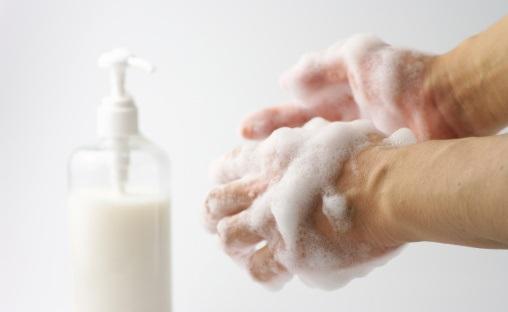The US Food and Drug Administration (FDA) today proposed a rule that would require companies that make antibacterial hand soaps and body washes to show that the products are safe for long-term use and are better than regular soap and water in preventing illness and the spread of infections.
Under the FDA's proposal, manufacturers that don't demonstrate the safety and effectiveness would be required to reformulate the products or relabel them to remain on the market, the agency said in a statement today. The FDA detailed its proposal in a 130-page report posted in the Federal Register and is taking comments on it over the next 180 days.
Today's rule proposal doesn't apply to hand sanitizers, wipes, or antibacterial products used in healthcare settings.
Part of broader risk-benefit analysis
The FDA's proposed rules are part of a broader effort to weigh the benefit and risks of certain active ingredients in antibacterial products, including triclosan in liquid soaps and triclocarban in bar soaps. Scientists have raised concerns about a possible role of widespread antiseptic use in the development of antibiotic resistance.
The FDA said in its Federal Register report that bacteria use the same resistance mechanisms against both antiseptics and antibiotics and that use of the products has the potential to fuel resistance to clinically important antibiotics.
The agency also said concerns have been raised about the hormonal effects of exposure to the antibacterial soap ingredients.
The FDA said in the Federal Register report that, for example, triclosan is absorbed through the skin and has been found in human breast milk and urine, and sampling since 2003 has shown consistent levels in urine samples collected from a representative sample of the US population. "We believe that the consequences of this systemic exposure need to be assessed," according to the report.
Janet Woodcock, MD, director of the FDA's Center for Drug Evaluation and Research, said in the statement that antibacterial soaps and body washes are widely and frequently used in home, work, school, and public settings where infection risk is relatively low. "Due to consumers' extensive exposure to the ingredients in antibacterial soaps, we believe there should be a clearly demonstrated benefit from using antibacterial soap to balance any potential risk."
The FDA urged consumers to make an educated choice about what products they use while the agency continues to collect more information on antibacterial soap and body washes, and it urged the public to remain diligent about hand washing. It said that if soap and water aren't available people should use an alcohol-based hand sanitizer that contains at least 60% alcohol.
Concurrent with the 180-day comment period on the proposed rule, companies have a year to submit new data and information, followed by a 60-day rebuttal period.
The FDA's Federal Register report notes that antiseptic maker trade groups have said that clinical studies in consumer settings would be difficult because of the cost and number of confounders, such as amount of product used, compliance with hand washing, and generally low levels of bacterial infections in the United States.
The agency estimated that the cost of the proposed rule—which would cover relabeling and reformulation—would range from $112.2 million to $368.8 million.
Industry response
In response to today's FDA announcement, the American Cleaning Institute (ACI) and the Personal Care Products Council (PCPC) issued a statement that said the proposed rule is the next step toward the FDA's finalizing the safety and efficacy of over-the-counter products, and it applauded the agency for moving rulemaking forward.
The two agencies said, however, that over the past two decades manufacturers have submitted a significant amount of information to the FDA on the safety and efficacy of the product category.
"We are perplexed that the Agency would suggest there is no evidence that antibacterial soaps are beneficial as industry has long provided data and information about the safety and efficacy of the products," the groups said, citing a 2011 meta-analysis that showed hand washing with antibacterial soaps was associated with greater reductions in bacteria on skin compared with non-antibacterial soap.
The two groups said they will file comments with the FDA that show that using the products in home settings doesn't contribute to antibiotic resistance.
Today's FDA proposal announcement is the agency's second policy move in the past week aimed at addressing antibiotic resistance. On Dec 11 it released final guidance to help pharmaceutical companies voluntarily curb the use of certain antibiotics to promote growth in food animals.
See also:
Dec 17 Federal Register notice
Dec 16 FDA press release
Dec 16 ACI/PCPC statement
Dec 11 CIDRAP News story "FDA completes plan for voluntary curbs on ag antibiotic use"
























